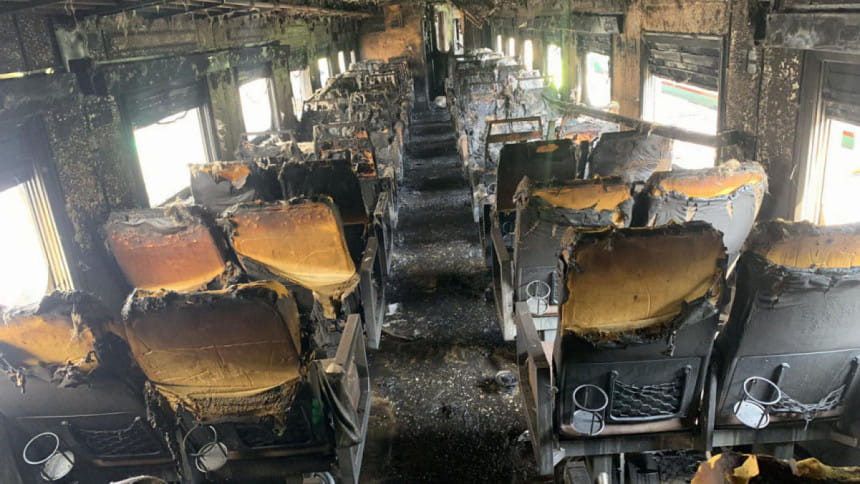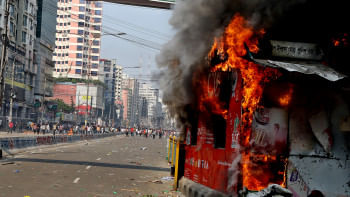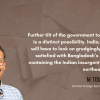When will the politics of burning people alive end?

Let's imagine a scene. "Fire, fire, fire! Please, help!" Screams are coming from a blazing train. Bystanders are hollering to stop the vehicle, while its passengers are burning alive. The black smoke casts out an ominous shadow. The passengers are struggling to open their eyes or breathe, while friends and family can't identify their loved ones. There's a burning desire to be rescued.
Now, another scene. A man, along with his spouse and child, had boarded the train. They were supposed to get off at the next station. Despite trying his best to save them, his beloved family fell victim to the blaze. Losing all that matters, he refuses to come out of the window, despite bystanders offering their hand to rescue him.
This the real tale of two arson attacks on trains, which took place two weeks apart. On December 19, the attack on Mohanganj Express claimed four lives, including that of a child. The perpetrators remain unidentified and unpunished even after so many days. Meanwhile on Friday, the Benapole Express fire has claimed the same number of lives so far, including that of two children and a woman. Eight people with burn injuries were admitted to hospital in critical condition. Police suspect this to be sabotage and a well-planned attack. The two major political parties are blaming each other for the incident.
Election-related violence is historically a common occurrence in Bangladesh, and naturally, multiple people have died leading up to this election. Fire incidents have been reported in Mymensingh, Khulna, Barguna, Sunamganj, Habiganj, Tangail, Shariatpur, Chattogram, and Gazipur. According to fire service's data, Dhaka city witnessed the greatest number of arson attacks on vehicles among metropolitan areas till late November, while Gazipur topped the list district-wise. There had been 197 reports of arson attacks on cars and buildings nationwide. Five polling centres in Rajshahi and Feni were reportedly set on fire on Thursday and Friday. Since Friday night, there have been reports of arson attacks at 13 centres across nine districts. While writing, I found the news of setting fire to three vehicles in Chattogram, Sylhet and Chandpur.
It's time to ask questions. Why haven't our law enforcers been able to identify those responsible for these heinous activities? What precautions were taken to ensure passenger safety in the wake of the Mohanganj Express fire? Why must regular people become victims of such violent politics? I wonder if I will ever get the answers. But I do know one thing: this culture of burning people alive must end.
Monira Sharmin is a climate columnist and research student of post-graduate programme in disaster management (PPDM), Brac University. Email: [email protected]
Views expressed in this article are the author's own.
Follow The Daily Star Opinion on Facebook for the latest opinions, commentaries and analyses by experts and professionals. To contribute your article or letter to The Daily Star Opinion, see our guidelines for submission.

 For all latest news, follow The Daily Star's Google News channel.
For all latest news, follow The Daily Star's Google News channel. 










Comments